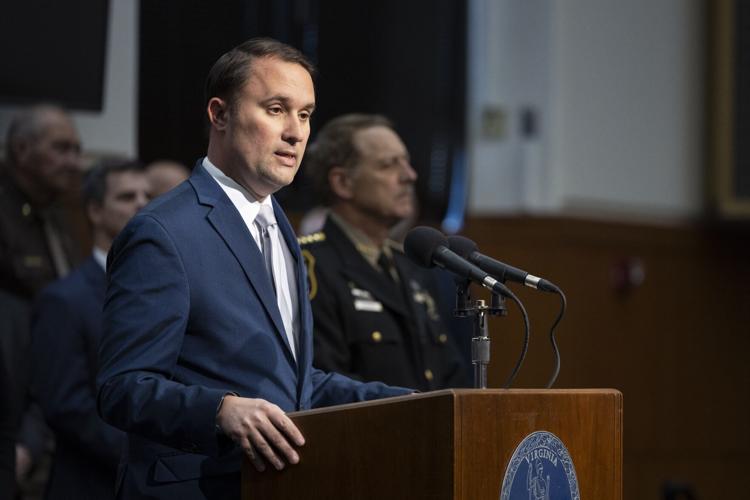The new games that skill games operator says are not covered by Virginia’s ban on the slot-machine-like devices are legal, a judge ruled.
District Court Judge Hugh McConnell dismissed a misdemeanor charge that David Bogese, owner of the Breez-In Mart in Mechanicsville, had an illegal gambling device.
McConnell ruled that since the new Queen of Virginia Skill 2 game in Bogese’s store did not require players to insert a coin, ticket or token, which is part of the definition of an illegal skill game in Virginia law, the new game was not subject to the state’s ban on skill games.

Zach Smith is seen in 2022 playing an electronic skill game at a 7-Eleven in Henrico County.
Virginia banned skill games in 2020, but a lawsuit challenging the prohibition as a violation of the constitution’s guarantee of free speech prompted a Greensville County judge to halt enforcement. The Virginia Supreme Court overturned that ruling in October 2023, reinstating the ban.
People are also reading…
In 2024, Gov. Glenn Youngkin vetoed legislation to legalize skill games after lawmakers spurned his bid for stronger regulations.
The new game, introduced last summer, is a modification of the original Queen of Virginia skill game.
Instead of inserting money to play the new game, players pay a store, truck stop or restaurant cashier and the cashier then remotely unlocks the device.

Attorney General Jason Miyares says the new machines are an attempt to circumvent state law and remain illegal.
In September, to prosecutors and law enforcement agencies, saying the new machines are basically the old illegal games with an unimportant tweak to get around state law.
Retailers hosting them were subject to a $25,000 fine for each device, Miyares’ memo said.
Youngkin called Pace-O-Matic’s new game an effort to find a way past Virginia’s ban. He said the company had broken trust that good-faith negotiations might find a way to help struggling stores that had relied on the slot machine-like devices.

Senate Minority Leader Ryan McDougle, R-Hanover, left, and Sen. Bill Stanley, R-Franklin County, successfully argued that the new skill games are legal under state law.
State Sen. Bill Stanley, R-Franklin, and Senate Minority Leader Ryan McDougle argued that the plain language of the law barred only those games that required insertion of money or token or ticket.
McConnell agreed, citing a legal principle known as the rule of strict construction applied in this case — that is, since the definition of a skill game included inserting an object and the new game did not require it, the new game was not illegal.
He also found that the law on skill games was too ambiguous to give business owners an understanding of which games are legal and which are not.
“Today, justice for the little guy won over government overreach, and the blatant attempt of the casino interests to exclude small businesses from participating in the gaming industry,” Stanley said.
Convenience stores have said skill games kept them in business during the COVID-19 pandemic and remained an important source of income afterward.
“It feels good to get this decisive ruling today defending the right for small businesses to operate within the law,” Bogese said.
Spokesmen for Miyares and Youngkin did not respond to requests for comment.
Rich Kelly, president of the Virginia Merchants and Amusement Coalition, a group of convenience stores, truck stops and restaurants that lobbied to legalize skill games, called the decision a victory for small business.
He said many of the group’s members were operating the new Queen of Virginia games.
“Many of our members are hopeful to begin operating the legal skill games again, as they had come to rely on the income for years to make ends meet,” Kelly said.
Nick Larson, spokesman for Virginians Against Neighborhood Slot Machines, said the new game exploits a legal loophole.
“Pace-O-Matic and its affiliates have continually tried to enter Virginia’s gambling market through the back door,” he said. “The General Assembly has made it clear: so-called games of skill are illegal. Any attempt to reframe these machines as lawful is simply an effort to circumvent the legislature’s clear intent.”
In 2024, the General Assembly passed legislation legalizing skill games with a 31-9 vote in the state Senate and a 51-45 vote in the House of Delegates. Youngkin vetoed the bill after the Senate rejected his proposals for tighter regulation of the devices.
Legislation this year died in the Senate Finance Committee. An effort to legalize skill games with language in the state budget also failed.

















